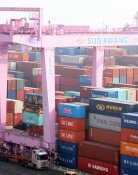Crisis from SVB’s collapse feared to spread
Crisis from SVB’s collapse feared to spread
Posted March. 13, 2023 07:41,
Updated March. 13, 2023 07:41
The shocking collapse of Silicon Valley Bank, American startups’ financial lifeline, has sent a shockwave to the global financial market. The bank has been an incubator for new undertakings for 40 years, but it took only two days for the bank with 209 billion dollars in total assets to fail. With memories from the 2008 global financial crisis sparked by the collapse of Lehman Brothers still fresh, the concern is mounting over what comes next.
The second largest collapse of a U.S. bank in history is the case that illustrates how vulnerable the American financial system has become due to Washington’s aggressive rate hikes. Financial institutions that invested big time in U.S. treasuries during the low-interest era have suffered losses due to plunging bond prices. SVB sold bonds en mass to secure cash as venture companies' main clients saw their cash flow drying up, but the bank failed to respond to bank runs fast enough. SVB’s collapse could lead to ‘contagion’ among regional banks.
It is expected that there is little chance for the crisis to develop further to become a systemic crisis, but we should stay vigilant. Notably, the Korean economy, which heavily depends on the global growth market, cannot afford to stay off guard. The economy has a structure wherein hiked uncertainties in foreign markets can easily lead to instability in the financial market, such as a stock market plunge or soaring foreign exchange rates and shock on the real economy. SVB’s collapse is set to affect the Asian market including South Korea in earnest from as early as today, and South Korea should keep a close watch on the evolving situation.
In the wake of the U.S. bank’s failure, which revealed the vulnerability of the U.S. financial system, Seoul should carefully inspect whether there is any loophole in the local financial market. On top of the lingering impact of a financial crunch in the corporate bond market stemming from Gangwon Province’s temporary denial to honor the asset-backed commercial paper for the Lego Land project, there is a slew of potential financial bombs including real estate project financing, corporate credit crunch, and massive household debts. Seoul should carefully manage the financial market to prevent small embers from becoming a massive fire and resulting in capital flight and a systemic crisis. With investment in venture companies already sluggish here, Seoul should prepare for a situation where the crisis could cause the startup ecosystem to contract further, resulting in a corporate financial crunch and domino bankruptcies.
The government should not be indifferent to the crisis as if it is none of Korea’s business, blindly saying ‘it will have limited impact on the Korean market.’ It should closely monitor fluctuations in the Korean financial market and factors of uncertainties to mitigate any negative impact. Korea also should find measures to help Korean startups and venture capital firms, whose funds have been stuck in SVB due to the bank’s downfall. Korean financial institutions should use this crisis to double-check whether they have built a bulwark strong enough to withstand crises.







